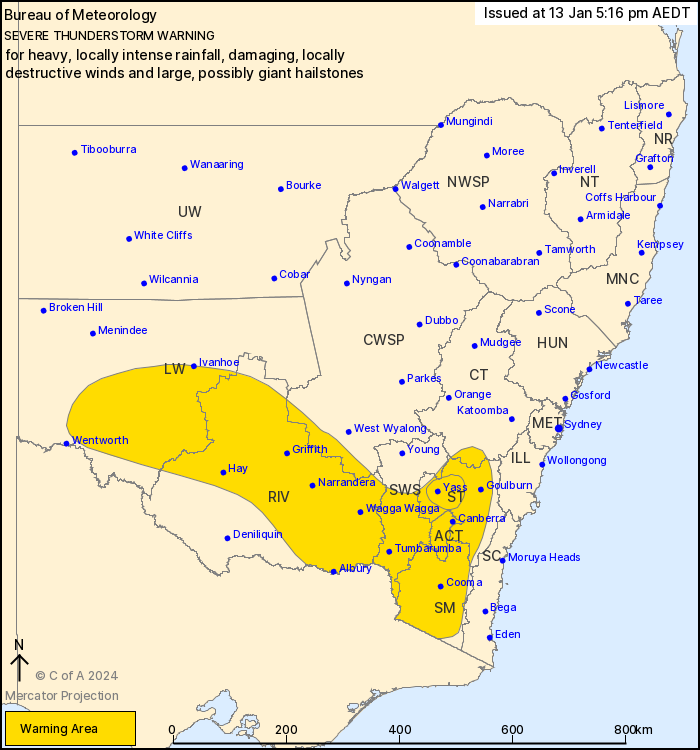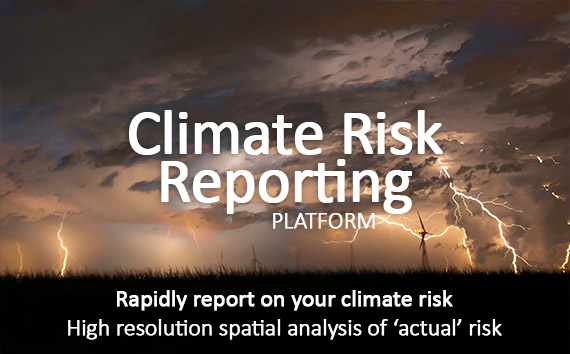Source: Bureau of Meteorology
For people in Southern Tablelands, Riverina, Snowy Mountains,
Australian Capital Territory and parts of Central Tablelands,
Central West Slopes and Plains, South West Slopes, Lower Western
and South Coast Forecast Districts.
Issued at 5:16 pm Saturday, 13 January 2024.
VERY DANGEROUS THUNDERSTORMS APPROACHING YASS FROM THE SOUTHEAST,
WITH LOCALLY INTENSE RAINFALL, DESTRUCTIVE WINDS AND GIANT HAIL
POSSIBLE.
Weather Situation: A trough of low pressure combined with a moist,
unstable atmosphere is triggering severe thunderstorms.
Severe thunderstorms are likely to produce heavy rainfall that may
lead to flash flooding over the next several hours in the Southern
Tablelands, Riverina, Snowy Mountains, Australian Capital Territory
and parts of the Central Tablelands, Central West Slopes and
Plains, South West Slopes, Lower Western and South Coast districts.
Locations which may be affected include Canberra, Goulburn, Wagga
Wagga, Albury, Griffith and Hay.
Severe thunderstorms are likely to produce damaging, locally
destructive winds, large, possibly giant hailstones and heavy,
locally intense rainfall that may lead to dangerous and
life-threatening flash flooding over the next several hours in
parts of the Southern Tablelands district. Locations which may be
affected include Yass.
59.6 mm of rainfall recorded in the 1 hour to 5:04 pm at Lake
Burley Griffin.
49.8 mm of rainfall recorded in the 2 hours to 5:05 pm at
Quenbeyan (Hindmarsh).
44 mm of rainfall recorded in the 30 minutes to 4:45 pm at
Tuggeranong.
Cherry Flat (Cooma) recorded 28.0 mm in the 30 minutes to 2.53
pm.
Bondo (Cooma) recorded 34 mm in the 30 minutes to 3.19 pm.
Benefield (Cooma) recorded 27 mm in the 30 minutes to 3.27
pm.
Koolaroo (Cooma Creek) recorded 33 mm in the 30 minutes to 3.34
pm.
Booligal recorded 32 mm in the 30 minutes to 3.46 pm.
The State Emergency Service advises that people should:
* Move your car under cover or away from trees.
* Secure or put away loose items around your house, yard and
balcony.
* Keep at least 8 metres away from fallen power lines or objects
that may be energised, such as fences.
* Report fallen power lines to either Ausgrid (131 388), Endeavour
Energy (131 003), Essential Energy (132 080) or Evoenergy (131 093)
as shown on your power bill.
* Trees that have been damaged by fire are likely to be more
unstable and more likely to fall.
* Keep clear of creeks and storm drains.
* Don't walk, ride your bike or drive through flood water.
* If you are trapped by flash flooding, seek refuge in the highest
available place and ring 000 if you need rescue.
* Be aware that run-off from rainfall in fire affected areas may
behave differently and be more rapid. It may also contain debris
such as ash, soil, trees and rocks.
* After bushfires, heavy rain and the loss of foliage can make the
ground soft and heavy, leading to a greater chance of
landslides.
* Unplug computers and appliances.
* Avoid using the phone during the storm.
* Stay indoors away from windows, and keep children and pets
indoors as well.
* Stay vigilant and monitor conditions. Note that the landscape
may have changed following bushfires.
* For emergency help in floods and storms, ring the SES (NSW and
ACT) on 132 500.

13/Jan/2024 06:23 AM



